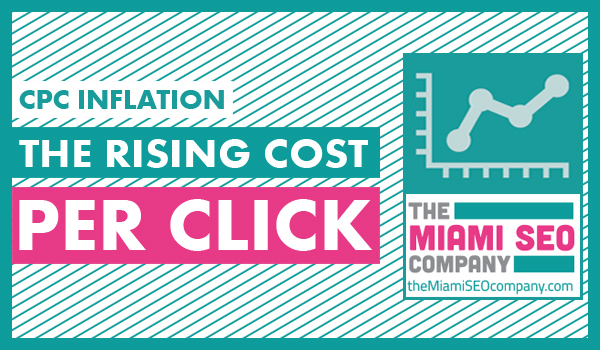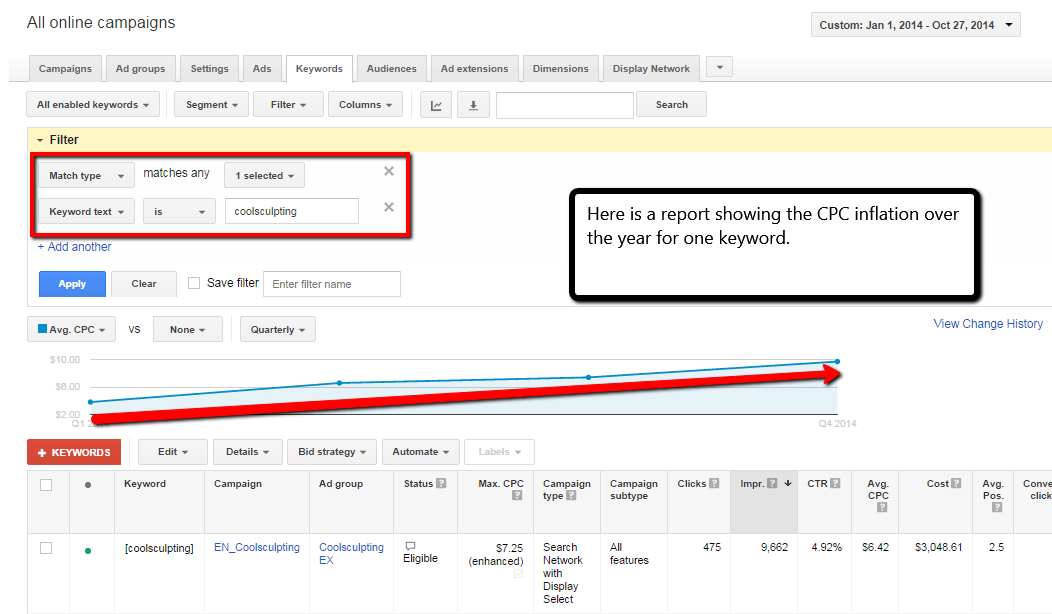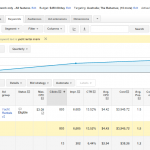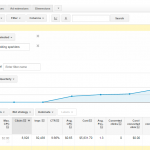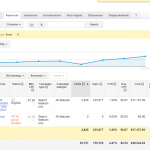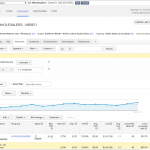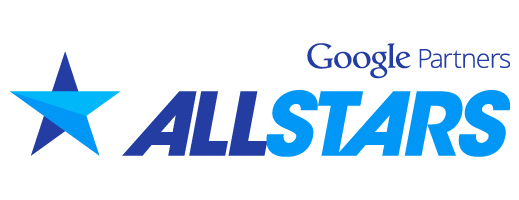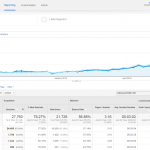CPC Inflation 101
Today I’d like to cover a topic that I’ve seen tons of controversy over online. Cost-per-click inflation!
In short, CPC inflation or cost-per-click inflation refers to the inflation of your keyword-cost over time for each click that you pay for as an advertiser. The cost for each click is dependent upon the keyword for which you show up for and many other factors including what your competition is willing to pay for that specific keyword’s coveted top position on the results page of Google (and other search engines).
Naturally, over time each keyword’s CPC increases because advertisers are constantly willing to pay more and more for each click as long as they remain at the top of the page. At a certain point, each keywords relative CPC can become too high to justify the expense depending on your business model. At which point, you would decide to not show for that keyword and work with other, less expensive keywords. Today I’d like to dive into each section of CPC inflation and how it can apply to real world scenarios. In the end, you may learn that the keywords which you want to show up for aren’t necessarily the best ones to use. The reason is because monopolistic-like marketing spaces like Google’s SERP’s, are run by corporate giants that inflate the CPC of keywords to the point where it’s impossible to compete (aka CPC bullying).
Let’s take a look at some easy to digest facts by analyzing the CPC of the keyword “coolsculpting” which is a relatively new cosmetic procedure performed by cosmetic surgeons. One of our clients is a cosmetic surgeon based out of Miami (where people love to get cosmetic surgery) and it is very clear that lately, this type of new cosmetic surgery has grown in popularity as the CPC is increasing at a staggering rate with a relative increase in search trends (as seen in the Google trends graph above). The reason is because this new service is being promoted by almost every plastic surgeon that advertises online and as new surgeons start to advertise online for the first time, the CPC bids are increasing as each plastic surgeon tries to offer the highest bid for the keyword “coolsculpting” as shown in the graph below.
What Does The Data In The Image Above Mean?
Great question, in a nutshell, the linear graph is showing the average CPC over time for the keyword [coolsculpting]. The report shows the average CPC for each quarter in the year 2014.
- In the first quarter of 2014 the CPC for the keyword [coolsculpting] was $3.81
- In the second quarter of 2014 for CPC for the same keyword [coolsculpting] was $6.59
- In the third quarter of 2014 for CPC for the same keyword [coolsculpting] was $7.40
- In the fourth quarter of 2014 for CPC for the same keyword [coolsculpting] was $9.71
Depending on how much you deal with PPC campaigns, this may seem like someone is doing a bad job at managing a campaign if the keyword cost just keeps going up. In all reality that is not the case, the quality score for this particular client has always been a 10/10 and the CPC is the only thing that is changing. The reason again is because the competition is getting a positive ROI from this keyword and they are going to constantly increase the bid to ensure they are at the top until the CPC is too high to justify the CPC. Depending on your business model, your CPC limit may be higher or lower than your competition but one thing is for sure. The keywords that are broad in nature always increase in price quickly. The long tail keywords are the ones to typically come with a lower cost per click because of the fact that competition has not driven the cost up yet.
Show Me More Data That Proves It’s Not Just One Example!
To prove that majority of the popular keywords in any given industry ALWAYS GO UP IN PRICE OVER TIME, you should simply dive into your Adwords campaign and filter out only the data pertaining to one keyword that has been set to exact match and you will see something similar to what I showed you above. To create a report that shows the CPC of only one keyword over time, you would need historical data in Adwords for a keyword that was set to exact match for a long period of time. If you have this, you can simply log into your Adwords account, click on the “keywords” tab while under the All Online Campaign view and you should be able to create a filter to segment out the data that you wish to see. In this case, you’d want a match type filter first to filter our only the exact match version of your keyword and a secondary filter set to match the keyword text or in this case, the exact keyword you want to analyze. A simple tutorial of how to do so can be found here. If you don’t have a PPC account yet, I’ve taken the liberty to create a collage of images showing the CPC of a single keyword going up over time. Why? Because as an analyst, I rely on large data samples for consistency when making a decision, when I see thousands of cases like this, I believe that the case is closed. CPC inflation is real and there is nothing anyone can do to stop it, you can however, bid smarter not harder 🙂
The one thing you can do, it beat your competitors by using logic. The way to combat CPC inflation is to find opportunities that your competitors have not taken advantage of yet. A perfect example is creating keyword ads that are very specific which are known as “long-tail keywords”. long tail keywords are basically longer variations of popular keywords which contain fewer words per phrase. For example, a popular keyword like “Web Design Company in Miami” has thousands of long-tail keywords like “Best web design company in Miami” or “affordable web design company in Miami”. Corporate giants and industry lions typically have tons of money to spend on gathering long tail keyword ideas by telling Google to show their ad as long as certain words are used in the searchers query. This strategy is known as using broad matched keyword ads, so basically, you can tell Google to show your ad only when someone uses certain words in the search query and there are tons of other features you can use to control the way your ads show. The benefit of doing this is that you will get tons of great keyword ideas from you audience which you can then use to create highly specific ads and landing pages for.
A Brief Introduction to Keyword Match Types
To learn more about keyword match types and how to use them in your paid search campaign I encourage you to watch the quick video below which is brought to you by Google Awords.
Over time when you use broad match keywords, you end up getting a ton of invaluable data that your competitors would love to get their hands on. That’s the beauty of PPC marketing, you can control when, where and how your ads show to obtain keyword data which you can use in many ways (not just through PPC advertising). The fact that your competition has been doing SEO and PPC advertising longer than you shouldn’t discourage you, there are always ways to penetrate the market, you just need to work smarter not harder by going after the low hanging fruit keywords like the long tail keywords I mentioned earlier. If you go after the easier keywords from the start, you can build your websites credibility while still getting some exposure to highly relevant searchers that want YOUR products or services. The problem is that there are literally an immeasurable amount of keyword ideas out there and the only way to gather them is by spending money. I know it really does suck but hey, that’s the way it works and the sooner you realize it the sooner you will be at peace with the fact that you are spending money on something that will pay off in the long run.
To give you a perfect example, when we first started our PPC campaign, we set our broad match keywords for “web design Miami” because it had the highest search volume so when and if someone typed in that keyword or something similar, our ads would show. Over the course of one month we paid over $3,000 dollars and we didn’t acquire a single new client… What we did obtain was priceless though, we obtained tons of search query ideas from our ad impressions and clicks! We were able to see how people not only clicked our ad but how they saw them (each time your ad is viewed, it is recorded as and is referred to as impression in Google Adwords). So by spending the money initially, we found that people were using very specific keywords like “web design company in Miami that specializes in eCommerce Magento sites” believe it or not. The number of long tail ideas that you can come up with depends on your creativity and ability to think outside of the box, or in this case, the amount of money you’re willing to spend… There are several tools out there but the truth of the matter is most of them only have data that pertains to popular keyword ideas.
Reset Your Expectations & Decide if PPC Advertising is a Good Fit
So contrary to what some of you may have thought, PPC doesn’t give you instant results. In all reality, you have to spend some money to collect data and that can mean thousands or millions of dollars depending on what your business model allows. My goal is to inform the clients that come to our organization expecting to have found a cure-all solution to their business problems. PPC advertising is something that is tough, and it takes time. If it didn’t, everyone would be doing it. The ones that tough it out and put skin in the game to fine tune their campaign as they collect data will succeed.
Almost every day, I speak with someone who thinks they know which keyword they “need” to show up on Google for at all times no matter what because that’s the “best” keyword (so they think). In actuality, the same keyword that you feel might be the best, is typically the worst possible keyword you can pay for. For those of you who are new PPC advertisers, hopefully now you are a bit more knowledgeable in the field and will have a better understanding of how to choose your keywords for a new campaign without any conversion data. I’d encourage you to check out my older post titled “Why Google Adwords Hasn’t Worked For You” as it will prevent you from making one of the most common mistakes first-time Google advertisers will make when setting up a new campaign.
